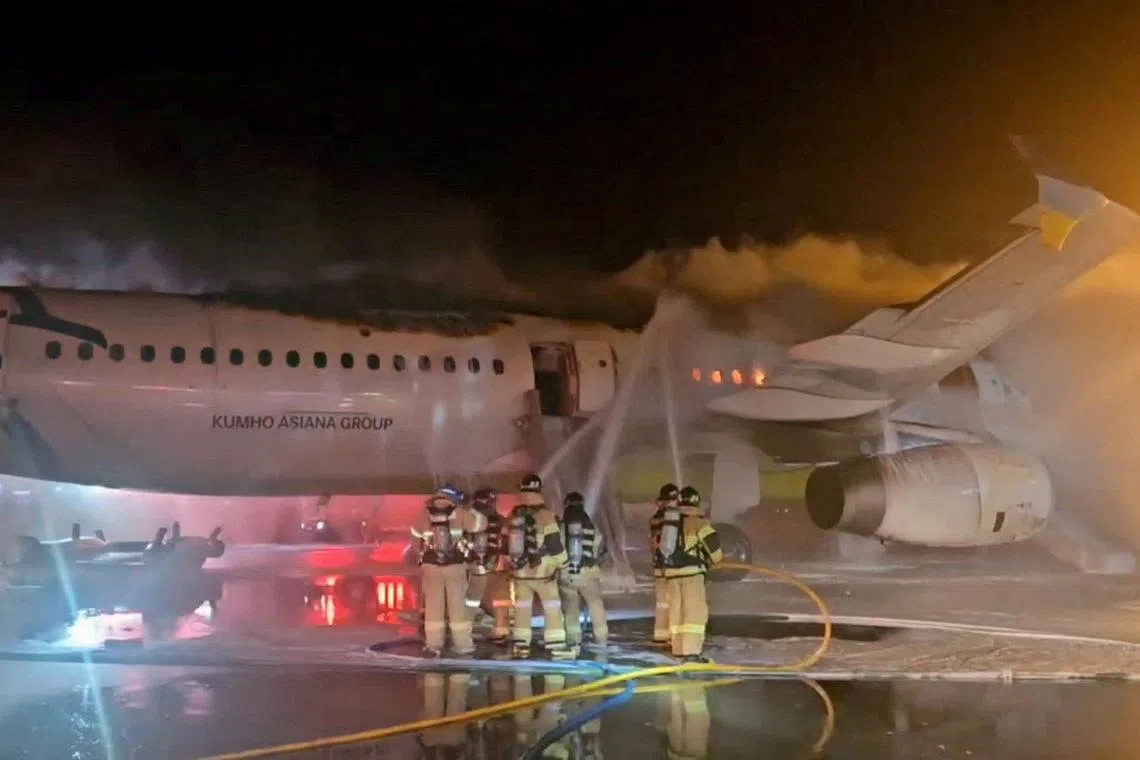Air Busan Bans Power Banks in Overhead Bins After plane Fire Incident
SEOUL – In a decisive move to enhance passenger safety, South Korea’s Air Busan has announced a ban on storing power banks in overhead cabin bins.This pre-emptive measure, effective February 7, comes in response to a recent fire incident that engulfed one of its planes.
The fire, which occurred on January 28, broke out in an overhead luggage bin on the rear left-hand side of an Airbus A321-200 preparing for departure to Hong Kong. A flight attendant detected the blaze,prompting the safe evacuation of all passengers and crew. While the exact cause remains under investigation,speculation points to a faulty power bank as the potential culprit.air Busan’s new policy mandates that power banks must be carried by passengers during flights. This ensures that any overheating, smoke, or fire can be quickly identified and addressed. Carry-on bags will be inspected at boarding gates, and those without power banks will be tagged and permitted in overhead bins. The airline plans to implement these measures on trial routes before expanding them to all flights.
The incident underscores the risks associated with lithium batteries, commonly found in devices like laptops, mobile phones, tablets, and power banks. Global aviation standards already prohibit these batteries in checked luggage due to thier potential to ignite intense fires if damaged or defective.
Along with the power bank ban, Air Busan is enhancing safety protocols by providing additional fire training for crew members and equipping planes with advanced fire containment tools. These measures aim to mitigate the growing issue of power bank overheating, which has become a concern for airlines worldwide.
Key Points of Air Busan’s New Safety Measures
Table of Contents
| Measure | Details |
|————————————–|—————————————————————————–|
| Power Bank Storage | Power banks must be carried by passengers, not stored in overhead bins. |
| Bag Inspection | Carry-on bags will be inspected and tagged at boarding gates. |
| Implementation date | Trial routes begin February 7, with plans to expand to all flights. |
| Crew Training | Additional fire training for cabin crew. |
| Fire Containment Equipment | Enhanced tools to isolate and manage onboard fires. |
The aviation industry continues to grapple with the challenges posed by lithium batteries. As Air Busan takes proactive steps to address these risks,passengers are reminded to adhere to safety guidelines and remain vigilant during flights.
For the latest updates on this developing story, join ST’s Telegram channel.
Air BusanS Power Bank Ban: Insights from an Aviation Safety Expert
In the wake of a recent fire incident, Air Busan has announced stringent measures to enhance passenger safety, including a ban on storing power banks in overhead bins. To understand the implications of these changes, Senior Editor of world-today-news.com, David Myers, sat down with Dr.Emily Carter, a renowned aviation safety specialist, to discuss the risks of lithium batteries and the steps airlines can take to mitigate potential hazards.
The Incident and Immediate Response
David Myers: Dr. Carter, can you explain the importance of Air Busan’s recent decision to ban power banks from overhead bins?
Dr. Emily Carter: Absolutely, David. The decision stems from a fire incident on January 28, where a suspected faulty power bank caused a blaze in an overhead bin. power banks contain lithium-ion batteries, which, if damaged or defective, can overheat and ignite. storing them in overhead bins increases the risk as passengers and crew may not immediately notice the issue. By requiring passengers to carry power banks, Air Busan ensures quicker detection and response to any potential hazards.
Enhanced Baggage Inspection and Tagging
David Myers: Air Busan is also implementing stricter bag inspections at boarding gates. How effective is this measure in preventing similar incidents?
Dr.Emily Carter: Bag inspections are a crucial first step. By screening carry-on luggage for power banks and tagging bags without them, the airline can reduce the likelihood of these devices being stored improperly. It also raises passenger awareness about the risks associated with lithium batteries. Though, the success of this measure depends on consistent enforcement and crew training.
Crew Training and Fire Containment
David Myers: The airline is providing additional fire training for cabin crew and equipping planes with advanced fire containment tools. How do these changes improve safety?
Dr. Emily Carter: lithium battery fires are especially hazardous as they can escalate quickly and release toxic fumes. Enhanced fire training equips crew members with the skills to identify and manage such incidents effectively. Advanced containment tools, like fire-resistant bags and extinguishers designed for lithium fires, provide additional layers of protection. These measures not only mitigate risks but also boost passenger confidence in the airline’s safety protocols.
global Implications and Industry Standards
David Myers: Do you think Air Busan’s approach could set a precedent for other airlines?
Dr. Emily Carter: Definately. The aviation industry has been grappling with the challenges posed by lithium batteries for years. While existing regulations already prohibit these batteries in checked luggage, incidents like this highlight the need for stricter carry-on policies. Air Busan’s proactive measures could inspire other airlines to adopt similar protocols, ultimately raising safety standards worldwide.
Passenger Responsibility and Awareness
David Myers: What role do passengers play in ensuring safety with these new measures?
Dr. emily Carter: Passengers have a critical role to play. They should adhere to airline guidelines,avoid using damaged power banks,and keep these devices in thier carry-on luggage where they can be monitored. Additionally, passengers should remain vigilant and report any signs of overheating or smoke immediately. Awareness and cooperation are key to preventing accidents.
Conclusion
Air Busan’s new safety measures,including the power bank ban,enhanced bag inspections,and crew training,represent a important step forward in addressing the risks posed by lithium batteries. As Dr. Carter emphasized, these changes not only improve safety but also set a potential benchmark for the aviation industry. Passengers must also do their part by following guidelines and staying alert. Together, these efforts can help create a safer flying experience for everyone.
